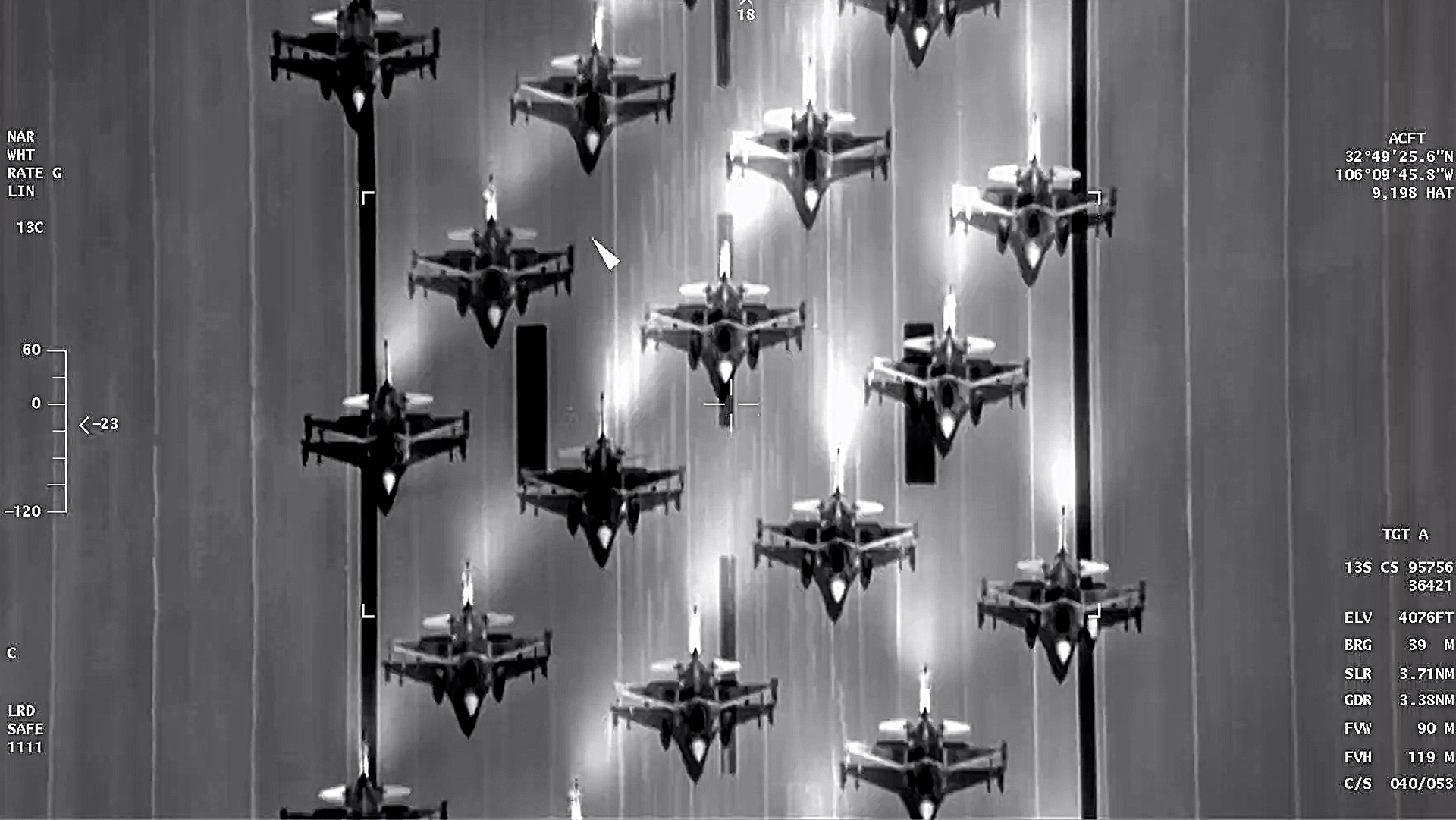Fans of U.S. Air Force “elephant walks” — shows of force that display levels of readiness, personnel skills, and sheer military might, as well as practicing generating large numbers of aircraft sorties quickly — have been spoiled for choice of late, with multiple such events taking place at airbases across the continental United States. Now we have the chance to watch a very unique elephant walk put on recently by Holloman Air Force Base in New Mexico in an equally unique way, via the MTS-B sensor turret on an MQ-9 Reaper drone flying above the runway.

The April 21 elephant walk at Holloman involved 49 aircraft — 40 F-16 fighter jets and nine MQ-9 drones, the two types that are operated by the resident 49th Wing. This pairing of manned fighters and unmanned tactical aircraft in a single elephant walk seems to be new and it is very likely just a glimpse of what’s to come in the not-so-distant future.
As well as the more familiar photos of the aircraft from the “Fightin’ 49ers” gleaming on the runway under the New Mexico sun, the U.S. military’s Defense Visual Information Distribution Service (DVIDS) has also released a video and still photos shot from one of the 49th Wing’s Reapers overhead the base as the aircraft sat in formation on the runway.

The TV and infrared footage provided by the sensors aboard an MQ-9 give a very different look at the now-familiar elephant walk. As the jets and drones gather on the runway, the thermal signatures from their engines show up as distinct white plumes on the infrared camera.









The F-16s involved in the elephant walk came from the 8th, 311th, and 314th Fighter Squadrons, while the MQ-9s are assigned to the 6th, 9th, and 29th Attack Squadrons. All these are training units, responsible for generating hundreds of combat-ready fighter pilots, remotely piloted aircraft pilots, and sensor operators every year. In fact, roughly a quarter of all fighter pilots in the Air Force at this time will have come through the Holloman training pipeline.
In an official release relating to the elephant walk, Col. Justin Spears, 49th Wing commander, explained: “When people mention Holloman Air Force Base I want them to picture the aircraft and mission that’s displayed in today’s elephant walk. We have the largest F-16 Viper and MQ-9 Reaper training pipeline and this elephant walk showcases the amount of airpower and manpower we can generate.”






“I think elephant walks are important as it shows our NATO partners and other allies around the world that we care about producing pilots and operators,” added Maj. Sean Robere, assistant director of operations at the 311th Fighter Squadron. “It also shows other parts of the world that we are continuing to produce capable airmen and aircraft.”

As mentioned, the show of force at Holloman Air Force Base is just one of a number of recent elephant walks hosted at different bases, involving a wide variety of aircraft types.
The latest series kicked off with a March 21 “weather flush” by seven E-3G Sentry Airborne Warning And Control, or AWACS, aircraft at Tinker Air Force Base, Oklahoma. This event was designed to give “aircrews, support squadrons, and maintainers a chance to practice generating the E-3G Sentry to evacuate the area quickly in the event of a weather emergency” and you can read more about it here.

On March 24, meanwhile, no fewer than 20 mobility aircraft at Altus Air Force Base, Oklahoma, took part in another severe weather exercise, intended to simulate a mass evacuation of aircraft. Those aircraft comprised eight C-17 Globemaster IIIs, seven KC-135 Stratotankers, and five KC-46 Pegasus tankers.

An elephant walk at McConnell Air Force Base, Kansas, on March 27, saw 21 tankers — 16 KC-46s and five KC-135s — line up on the runway as part of an Agile Combat Employment exercise, named Lethal Pride. The elephant walk launched the exercise and consisted of aircraft and aircrews from both the 22nd Air Refueling Wing and the 931st Air Refueling Wing.

The biggest of these events was hosted at Sheppard Air Force Base, Texas, on April 7, and saw no fewer than 80 training aircraft on the runway. Technical training students from the 82nd Training Wing joined 40 T-38 Talon and 40 T-6A Texan II trainers from the 80th Flying Training Wing, in what the Air Force described as an effort to “shine a spotlight on the importance of training as the foundation of airpower.”

Finally, following the April 21 elephant walk at Holloman, April 26 saw yet more tankers take to the tarmac, as 18 KC-135s lined up at MacDill Air Force Base, Florida, as part of Operation Violent Storm, an exercise designed to test rapid mobilization across different units.

All in all, we are now seeing elephant walks on a more regular basis, as the Air Force showcases the kind of readiness that could be utilized during a full-blown crisis. At the same time, elephant walks are undoubtedly eye-catching in and of themselves, providing a significant morale boost and means of celebrating a base and its resident units.
With that in mind, Holloman’s “Fightin’ 49ers” are to be congratulated on their different take on documenting an elephant walk, with their unique drone’s-eye-view of the event.
Contact the author: thomas@thedrive.com
